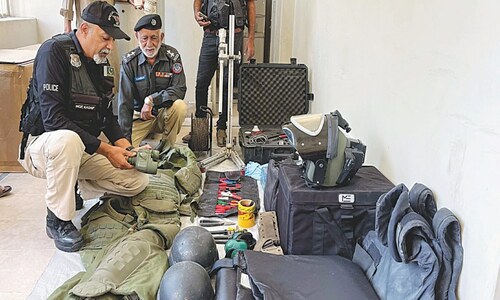KARACHI, July 10: Do male-dominated newsrooms act as a deterrent for women wanting to enter the profession? And are girls obtaining media science degrees to get good marriage proposals? Why are working conditions better for women in English media as compared to Urdu media? All these questions and more were discussed at the launch of a report titled “Who’s telling our story? A situation analysis of women in media in Pakistan” by Uks Research Centre and Danish International Development Agency on Wednesday.
“With the advent of private TV channels women reporters have changed the face of media altogether. You can now see them at the blast incident doing phone-ins, thus they are now doing hardcore reporting.
Earlier women were restricted to desks and magazines. At one point there used to be 140 women journalists and now there are 2,000 of them,” said Mazhar Abbas, director current affairs Express News.
Dr Tauseef Ahmed Khan, chairman of the mass communication department at Federal Urdu University, was of the opinion that parents of lower middle class and middle class women encouraged their girls to obtain mass communication degree in the hope that they would receive better marriage offers. He said: “Mentally, many women are not ready to work in the field since they do not want to work late hours and at workplaces that are at great distances from their homes.” Hence, he added, they changed their profession and often opted for teaching in nearby schools. However, Dr Khan observed, even those who did opt for the media profession poor pay and lack of facilities often made the profession undesirable for them.
Author and former magazine editor Bina Shah found the assumption of girls getting media science degree for better marriage proposals as ridiculous especially when women had proven themselves in every walk of life. “It is a mistaken belief that it is a risky investment to hire a woman as she will quit as soon as she gets married. Studies have shown that if women are provided crèche facilities, flexible working hours, they are likely to stay in the job far longer than men who will quit as soon as they get an offer of higher salary,” she added.
Mr Abbas disagreed with the assumption that working conditions were better for women in English media as compared to Urdu media.
“There are now a handful of English newspapers and most do not have good working conditions.
As for Urdu newspapers, they have always been inhospitable towards women who want to work in the newsroom.
The kind of atmosphere that is prevalent in the newsroom particularly the language used makes women uneasy who often have no choice but to leave the room.”
He also disclosed that some channels had separate rooms for women anchorpersons because they were uncomfortable interacting with their male counterparts.
Audience members such as Sheema Kermani, activist and artist, felt that larger number of women would enter and remain in the profession only when there was a change in the socio-cultural attitude of society. Until then, she said, only exceptional women would continue to dominate. Another member said that the press clubs should conduct training workshops and seminars with an aim to encourage women from rural areas, towns and cities to become journalists.
Since the audience comprised mainly academics and students from media sciences, the debate became much livelier and larger that included other related issues such as part-time journalism, gender debate, and fake crime stories on TV, and lack of equipment in mass communications departments of public and private universities.
Following the discussion, the participants were shown a documentary titled “More women in media” that focused on how journalism students were sensitized about gender and gender discrimination, the preparation of code of ethics for the media in Pakistan and other achievements of Uks Research Centre.













































Dear visitor, the comments section is undergoing an overhaul and will return soon.